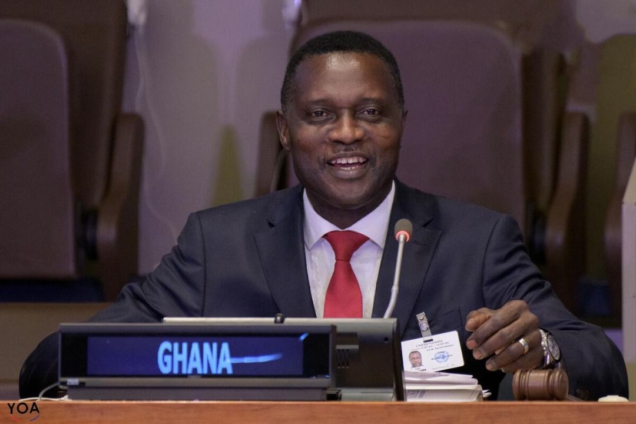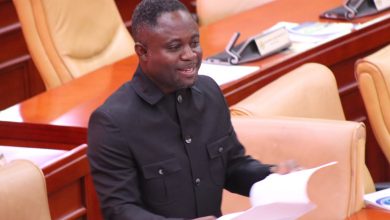Fraudulent payment for school placement traced to Education Minister’s access

A fraudulent payment made for the placement of a student into a category “A” school in 2022 was traced to the login access of the Education Minister, Dr Yaw Osei Adutwum.
This is contained in a testimony given by Prof. Kwasi Opoku-Amankwa, who was the Director-General of the Ghana Education Service (GES) at the time of the placement and the Ministry of Education’s investigative committee’s sitting to probe alleged corruption in the school placement.
Prof. Opoku-Amankwa was also one of only two persons with unfettered access to the computer system and could place or approve placement of students into category “A” Schools.
Access to protocol placement into the most prestigious senior high schools was limited to the Minister of Education and the Director General of the GES to curb the payment of money for placement into category “A” schools.
That restriction did not stop the acts of corruption in Ghana’s most sought-after schools, resulting in the setting up of a committee by the Ministry of Education. The committee was set up after the Ministry of National Security wrote to complain about allegations of corruption in the system.
The report of the six-member committee, which The Fourth Estate has exclusive access to, states: “He [Prof Opoku-Amankwa] sighted [sic] an example in one of the cases that was reported that an amount of GHS7000 had been charged to place someone at Wesley Girls or Achimota School. A probe using the log report on the system showed that it was done with the Hon. Minister’s access which was being handled by Ms. Vera Amoah.”
The report adds: “Prof Amankwah went on to say that subsequently, his permission to the log port on the placement system was blocked and so could not trace and act on complaints that came in thereafter.”
The committee spoke to Dr. Adutwum after taking Prof. Amankwa’s testimony, but the report does not state whether or not the minister denied the GES Director-General’s assertion that a fraudulent transaction was traced to his account.
When The Fourth Estate requested comment through the public relations officer of the Ministry of Education, the ministry declined to comment. It, however, said it would “study the investigative work, collaborate with relevant state institutions and address the issues raised accordingly.”
Prof. Opoku-Amankwa told The Fourth Estate that the system is designed such that he could see placements that were effected or approved by the Minister of Education and the Minister could also see what he did in the system. A week after the 2022 placement started, however, he said his access to the system was revoked without any explanation to him.
The technical consultant of the school placement system told the committee that the decision on who should be granted access to protocol placement on the computerised system was communicated to him in a memo.
“The consultant receives instruction in the form of a memo generated by the Free SHS Coordinator and signed by the Hon. Minister to assign protocol access to some identified officers,” the report states.
However, it emerged that the Minister of Education later initiated some changes and instructions which were not documented.
An Assistant Research Officer in charge of procurement at the Free SHS Secretariat, Mohammed Kamel Issa, was given access to the category C schools to help resolve some of the placement issues. But two weeks after the placement process, Kamal’s access was blocked.
“The coordinator later informed him that the Hon. Minister had requested to meet him in his office at the Ministry. According to Kamel, he sought to find out from his supervisors the purpose of the intended meeting with the Hon. Minister as well as the reasons for the revocation of his access but he did not get any response from them.
“The meeting with the Hon. Minister, however, did not come on because the Free SHS Coordinator later came to inform him that the Minister did not need him again,” the report stated.
A coordinator for the CSSPS centre, Mark Sosu Mensah, explained to the committee that the students were placed into schools categorised into A, A1, B, B1 and C. He told the committee, “he was initially given access to category “B1 and was later upgraded to category B schools. His access was communicated to him verbally by the Free SHS Coordinator. According to him, it was only in 2017 that his access was officially communicated to him in writing by the Hon. Minister.”
There were also other issues of corruption that the investigative committee discovered during the interrogation. A member of the Operations team at the Free SHS secretariat, Bright Appiah Kubi, “told the committee that he got a report that a parent paid GHS20,000 for the ward to be placed in Wesley Girls to read science but because he did not have access to the log report on the system, he could not check who did that placement.”
Mr. Appiah said in the past, such as in the 2019 placement, he could log in and verify who did the placement that was paid for.
Before the Ministry of Education set up its investigative committee, Prof Opoku- Amankwa had written to the National Intelligence Bureau (NIB) and the Criminal Investigations Department (CID) of the Ghana Police Service to investigate allegations of corruption in the placement of students into secondary schools.
The Fourth Estate understands that, following Prof. Opoku-Amankwa’s request, the NIB initially agreed and started the investigation, but exactly one month later, it wrote to the GES Director General, asking him to redirect his request to the CID.
The Fourth Estate sources say these investigations were stopped by “powers from above.” Prof. Opoku-Amankwa could not pursue this matter to the end. He was removed from office later that year.
He recently emphasised this in an interview with The Fourth Estate when he said: “If there is fraud in the matter, then I, as the Director-General, and the minister should take responsibility. I fully accept and agree, but I knew that I was part of it and I wanted to actually make sure that there were no challenges with it.”
Even while in office, Prof Opoku-Amankwa told the GES Committee that he could not “fully absolve himself from any issues of corruption because he delegated his access to one of his officers to do the work for him. He, however, went on to say that one good thing about the system is that anytime someone logs in with his credentials, he gets a notification alert to enable him to inquire into what was being done.”
Although the security agencies and the Ministry of Education’s committee did not uncover those behind the alleged fraudulent payments and placements, undercover investigations by The Fourth Estate revealed that a network of people charged money and placed students into category “A” and the most sought-after category “B” senior high schools in the country.
The Fourth Estate worked and then liaised with the police to arrest eight persons who are standing trial. None of them works at the Ministry of Education, Ghana Education Service, CSSPS Secretariat or the Free SHS Secretariat.
The Fourth Estate also found that protocol placement into the category “A” schools after payments were done could only be approved by the Minister of Education and the Director General of the GES.
Source- The Fourth Estate





